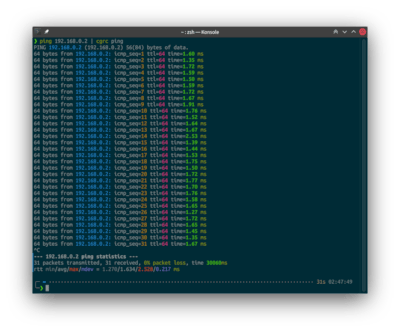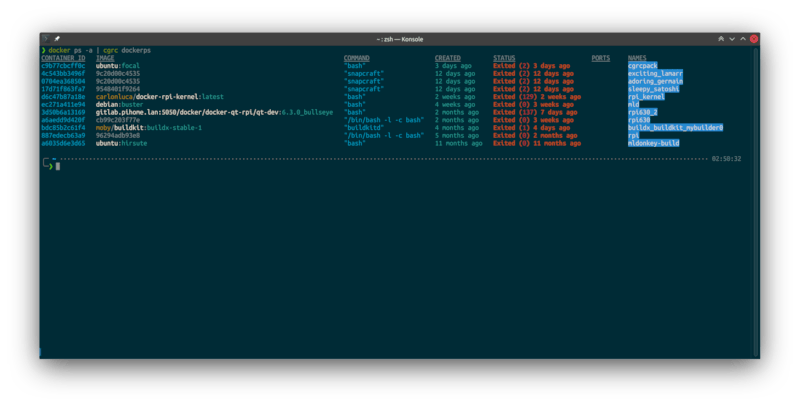7 stable releases
| 2.0.6 | Mar 29, 2025 |
|---|---|
| 2.0.5 | Jul 24, 2024 |
| 2.0.4 | Jan 24, 2024 |
| 2.0.3 | Jul 14, 2023 |
#23 in Configuration
22 downloads per month
1MB
707 lines
CGRC - Generic Colorizer
cgrc is a binary that can filter text to improve formatting in a console. It is based on the excellent grc tool, it was written in C++ with Qt and then rewritten in Rust. It should be mostly compatible with it, but only a selection of features that I needed were implemented. The reason why cgrc exists is that grc proved to be too slow for me in a few cases, so I quickly implemented a version for myself in C++ and then, just for educational purposes, in Rust. This means that currently only a few configuration files are available, but you can add everything you need. Open a MR if you want to add something to the repo.
Usage
cgrc should be mostly compatible with grc, so refer to https://github.com/garabik/grc for more info about the configuration file it needs. There are anyway a few changes that I found useful for me. This is the syntax of the command:
Configurable terminal text formatter
Usage: cgrc [OPTIONS] <CONF>
Arguments:
<CONF>
Options:
--list-locations
--location-user
--location-system
--list-configurations
--conf-path
--debug
-h, --help Print help
-V, --version Print version
List locations
cgrc enumerates configuration files from three different locations:
- embedded configuration directory;
- user directory;
- system directory.
The first location searched by cgrc is the binary itself. The binary includes some typical conf files. These files can be used without placing any configuration file on disk. The user directory is a user-specific directory, typically located in the user's home. The system directory is a directory in the filesystem accessible by any user. By using the --list-locations options, you can print the exact locations on your system:
Locations on your system used by cgrc:
System location: /etc/cgrc
User location : /home/luca/.config/cgrc
Locations may change according to the OS you are using or the installation method. Snap packages, for instance, cannot read regular locations under strict confinement.
List configurations
cgrc can print a summary of all the configurations currently available:
Embedded configurations:
logcat -> parser the android logcat output
nginx -> formats the default nginx log output
ping -> formats the output of the ping linux command
prio -> formats the output of logs containing typical words associated to priorities
dockerps -> formats the output of docker ps.
dockerstats -> formatter for docker stats
User configurations:
/etc/cgrc/dockerpsa -> formats the output of docker ps.
System configurations:
/home/luca/.config/cgrc/conf.dockerps -> formats the output of docker ps.
The description is included in the configuration file.
Run
cgrc reads from stdin and outputs to stdout. Example:
ping 192.168.0.2 | cgrc ping
where the second "ping" is the name of the configuration file to use. In this case, ping is a configuration file embedded in the binary.
Configuration
Refer to the grc readme for writing configuration files. If you wrote conf files for grc, then it is likely it may also work with cgrc. cgrc also reads a "desc" field in the configuration file. This description is reported once the --list-configurations option is used.
Installation
At the moment, only cargo installation is implemented.
Cargo
Snap packages are available for cgrc for architectures amd64, armhf and aarch64. To install:
cargo install cgrc
Build Yourself
cd cgrc-rust
cargo run
Examples


Configurations
There are only a few configurations available at the moment, the ones that I use. You can add your own configurations if you want into local files. If you want to share your configurations, please open a MR.
Dependencies
~4–12MB
~137K SLoC